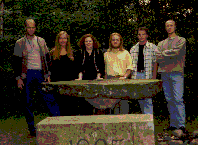Interview

(Progressive Newsletter Nr.17 11/97)
excerpts from an interview with Rickard Biström (Bass)
The story of the band is a bit tricky to describe in short, but Fredrik and Robert started to play together in 1987 and did at first mostly covers of progressive bands like Genesis, Yes and Jethro Tull. Early 1991 the drumer and singer left and I joined on drums and we started to write our own material. Later on Linda joined and in the fall of 1994 I changed from drums to bass and we started sharing the vocals. In 1995 Lena joined on cello. Our newest member Mats, joined in December 1995 and three months later we recorded a demo-tape and sent it to different labels. That's how we got in contact with Malcom Parker from Cyclops and signed to that label. A more thorough history is, or will soon be, available on our home page. Lena is the only one with any formal musical education apart from occasional music lessons on our respective instrument. Especially Mats and I have played in several local bands before joining Sinkadus.
What's the meaning of the band's name?
Sinkadus is a dialectal expression and it means a whole lot of different things. It stands a little bit for what our music is about; a smack in the face, a soothing touch!?
In my opinion your style is very much influenced from other swedish bands like Änglagård or Anekdoten. Did this influence happen accidentally or are they kind of role models for you?
I think it is entirely by accident. At least one of the songs on the CD, "Ågren", was written before we even heard of Änglagård and Anekdoten, and another one, "Ättestupan", before we actually heard them. I think perhaps the similarities is rather a result of having the same influences as Änglagård and Anekdoten than us being influenced by them ,even though we do like those bands a lot.

Do you have any explanation why at the moment so many interesting and very talented bands from the progressive rock genre do come from Sweden?
When we grew up, all people in school were allowed to learn to play an instrument. Therefore everybody that was interested learned to play an instrument. Today for economical reasons, this is no longer the case, you have to apply and the try if you're considered fit to play that particular instrument, which probably scares a lot of kids away from music. Why a lot of Swedes decide to play progressive rock, I have no idea, but regarding the common sound I think the swedish folk music can have contributed to it. During the larger part of the 80's the folk music was more or less dead in Sweden, but in the last ten years it has become increasingly popular and it is often combined with sometimes rather heavy rock. Many of the swedish progressive rock bands have also incorporated some folk muisc and I think this might be at least a part of the explanation for the common sound.
How did you get the chance to play at the Progfest in Los Angeles?
When we sent out the demos we sent a tape to Greg Walker who co-organises these shows. After the CD was released Malcom Parker contacted the organisers and they obviusly like it and Malcom arranged it all.
Which kind of expectations did you have concerning playing in the U.S.A.?
We didn't know what to expect really since this was our first concert abroad, but of course we were happy to get the opportunity. Progfest '97 was a wonderful event. The organisers, the concert hall and the audience were all just great. We had some problems with the equipment, but the audience seemed to like it lot anyway. The show was recorded and will hopefully released as a live CD by Cyclops.
Kristian Selm © Progressive Newsletter 1997